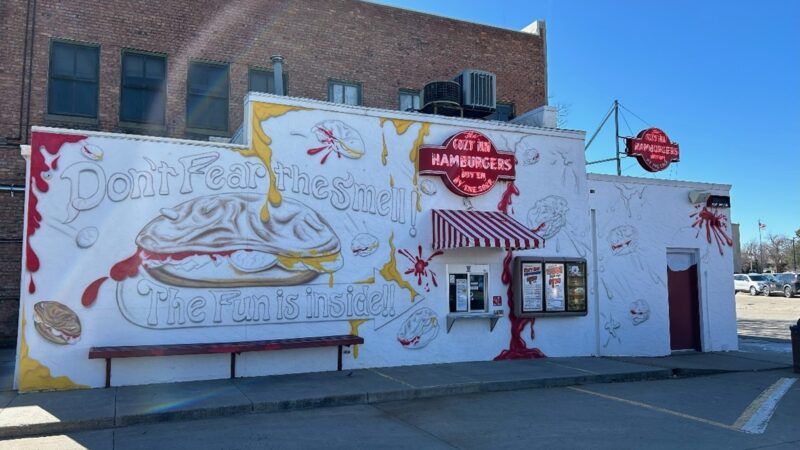Town Says Burger Joint's Mural Can't Show Any Burgers
Salina, Kansas, restaurant owner Steve Howard argues in a new lawsuit that the city's sign regulations violate the First Amendment.

Is a painting of a giant burger a sign or a mural? The answer to that question could determine whether Steve Howard can keep some half-finished burger art on the side of his restaurant or be forced to take it down.
Howard is the owner of The Cozy Inn in Salina, Kansas—a restaurant known for the sliders it serves with a generous helping of aromatic onions.
Back in November, Howard commissioned a local artist to decorate the side of The Cozy Inn with a large burger mural, some smaller slider-shaped UFOs, and a caption reading, "Don't fear the smell! The fun is inside!!"
Within a few days, a Salina official was telling Howard to halt the paint job. The city reasoned that because Howard's wall art would depict a product his restaurant also sold, it was not a mural (which the city doesn't regulate), but rather a sign (for which it has extensive rules).
Under Salina's sign code, Howard's business could only post signs totaling 62 square feet in size and he'd already used up 52 of those feet with existing signage. His planned burger wall art would take up 528 square feet. Downtown businesses' signs also need approval from the city's Design Review Board.
Since being told to stop work on his burger painting, Howard has been going back and forth with the city over whether he'll be able to complete the work. Earlier this month, the city sent him a letter telling him to hold off on the painting while it "reviewed" its signage regulations.
Rather than wait, Howard filed a federal lawsuit arguing that because the legality of his mural turns on the particular images it depicts, his free speech rights are being violated. If he had commissioned wall art of car parts or some other product his business didn't sell, he'd be well within his rights to proceed with the mural.
"In our view, this is a clear content-based restriction on speech," says Sam MacRoberts of the Kansas Justice Institute, which is representing Howard.
The U.S. Supreme Court theoretically put limits on this kind of sign regulation with its decision in the 2015 case Reed v. Gilbert, which struck down an Arizona town's regulations on temporary signs that applied stricter rules to nonpolitical signage.
"The town definitely was drawing lines based on what messages the signs conveyed," says Betsy Sanz, an attorney with the Institute for Justice (which is not affiliated with the Kansas Justice Institute). "The court said that was not allowed."
Nevertheless, cities post-Reed continue to enforce restrictions on business murals that include images of what the business sells.
The Institute for Justice has litigated multiple mural cases, pre- and post-Reed. It is currently representing business owner Sean Young in a First Amendment lawsuit against Conway, New Hampshire, which has told him a donut mural painted by local art students on his bakery violates the town's sign code.
Despite the likely unconstitutionality of many towns' sign restrictions, business owners are often reluctant to challenge them.
That means businesses will often just paint over their murals or change them so that they're no longer showing products the business sells.
In 2012, The Washington Post reported on a smoke shop in Arlington, Virginia (a hotspot of mural censorship), that changed its mural of a man smoking a cigar to a man holding a whale to comply with county regulations.
Sanz urges the Supreme Court to take up the issue of towns' regulation of business murals, saying, "There are still government bodies that wish to control speech. The Supreme Court is going to need to take signs up again to help clarify things for individuals."
Rent Free is a weekly newsletter from Christian Britschgi on urbanism and the fight for less regulation, more housing, more property rights, and more freedom in America's cities.


Show Comments (25)